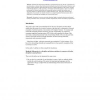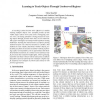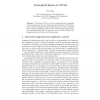451 search results - page 28 / 91 » Learning Multiple Languages in Groups |
103
click to vote
IFIP
1997
Springer
15 years 6 months ago
1997
Springer
: National and international standards for professional groups may become a dominant and governing force as internet-based professional training becomes universally accepted. Educa...
128
click to vote
ECAL
1999
Springer
15 years 7 months ago
1999
Springer
We report on a case study in the emergence of a lexicon in a group of autonomous distributed agents situated and grounded in an open environment. Because the agents are autonomous,...
125
Voted
WACV
2005
IEEE
15 years 8 months ago
2005
IEEE
As tracking systems become more effective at reliably tracking multiple objects over extended periods of time within single camera views and across overlapping camera views, incre...
147
click to vote
ICMLA
2009
15 years 13 days ago
2009
Languages that combine predicate logic with probabilities are needed to succinctly represent knowledge in many real-world domains. We consider a formalism based on universally qua...
119
Voted
ESWS
2008
Springer
15 years 4 months ago
2008
Springer
We describe ViCoS, a tool for constructing and visualising conceptual spaces in the area of language documentation. ViCoS allows users to enrich existing lexical information about ...



